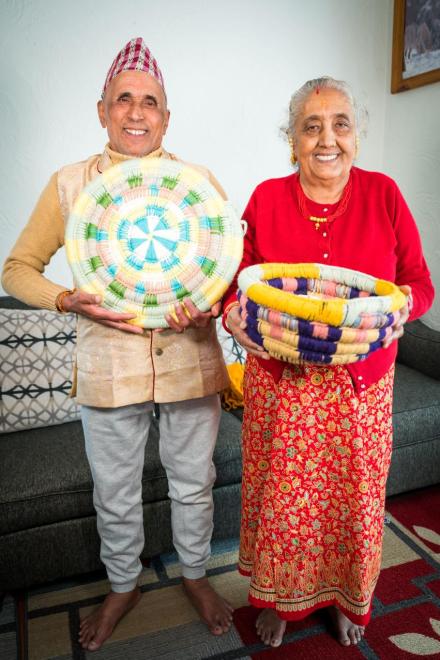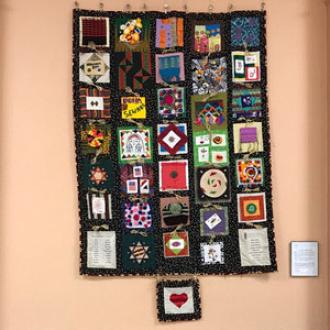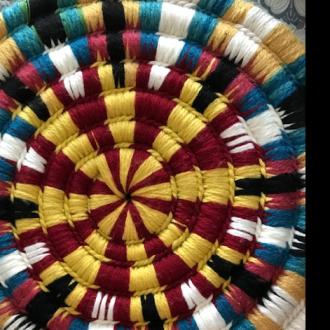
Nandi Guragai is a Nepali-speaking refugee artisan from Bhutan. He works in bamboo, cloth, and yarn. His wife Kausila, also from Bhutan and also Nepali-speaking, makes pira or small seating mats from strips of colorful fibers (and sometimes, strips of cloth). In their original home in Bhutan and then in the refugee camp in Nepal, such pira mats would be offered to honored guests as a place to sit. The pira were also used in rituals and as a lucky, health-giving place for welcoming newborns. Today in Worcester, MA and in collaboration with Refugee Artisans of Worcester, the couple market and sell their crafts to broad audiences of Americans who happen to appreciate well-made crafts created with great attention to detail (Rodgers and Umunna 2017, Path to Empowerment, pp. 18-20).
Nandi is ebullient and notably talkative and finds joy in speaking about his craft-making. As a retired man age 80, he enjoys the chance to weave bamboo crafts and to knit garments; he also relishes pira-making craftmanship. He cites the “sense of belonging” he feels from creating Bhutanese crafts such as bamboo baskets and bowls and pira . But he also takes pleasure in turning out quantities of cozy knitted hats, winter scarves, and sweaters in Western stitches types and styles. For him, branching out into winter-time knitwear is a welcome change of pace; RAW’s Joan Kariko describes him as always “knitting up a storm.”
It is clear that family is very important to Nandi. Craft-making itself is a family affair: Kausila is also an expert pira crafter. The Guragai’s pira mats are made from brightly colored cloth, with patches of eye-catching hues. These pira make for forthrightly, diagnostically Bhutanese decorations for anyone’s home. One of their daughters, Tirtha, has also begun learning how to make pira mats. While happily showing visitors his and his wife’s colorful handmade craft collection, Nandi pointed toward one pira that his daughter had recently woven and remarked that she “was still learning.” Joan says that the family has a sort of competition among themselves to see who is making the most tightly woven pira.
Alongside a devotion to expert craft making the family also values family obligations and formal education. In home visits we always heard a lot about how far each grown child has gone in school and university. Kausila once showed her deep devotion to her family by making at least 100 candle wicks in a short number of days so that they could be used in a ceremony to ask spirit forces to help the family to bring one of their sons (in Nepal) to the United States. The candles were lit and the smoke helped to convey the blessing request to the unseen world. That son remains in Nepal.
The entire family has remarkable devotion to each other and to crafting. Trips by the RAW crafters to the large bamboo-growing grove near Plymouth, MA is a particular scene where Nandi shows his energy in artisanry. The farm is Susanne Lucas’s ambitious enterprise, built and maintained as a way to promote bamboo as an environmentally-friendly, sustainable crop with many practical and artistic uses worldwide. Susanne is now the director of the World Bamboo Society; she welcomes the RAW artisans on their periodic visits to the grove, to harvest bamboo for their craft work. Nandi greeted Susanne warmly during a summer, 2022 trip and reminisced about the bamboo harvesting during a previous visit, when only the bamboo stumps were left in the ground – the RAW artisans were so enthusiastic in gathering so much bamboo for craft making back in Worcester that they basically left only the bases of the trees. Nandi ventured farther into the farm land than most others, climbing up slopes and navigating his way through bamboo thickets and fallen trees. Along with other artisans such as Bhim, he was on the lookout for larger bamboo (in contrast to the thin, small-diameter bamboo that is all to be found in Worcester gardens and backyards). Nandi was one of the last artisans out in the bamboo stands on this trip and in many others. Both basket makers prefer the experimental farm’s crop because bigger, wider bamboo is tougher, heartier, and can yield a larger range of crafts.
Nandi’s eye for detail in materials such as bamboo was also evident in the way he looked at objects such as woven bowls. He saw one of these when the RAW group had lunch at Susanne’s. He held the bowl at eye level and consulted with other artisans, trying to figure out how it was made. After his inspection he nodded and placed the bowl back down, presumably understanding the weaving pattern. During that same lunch, Nandi’s kindness was noticeable in the way he joked around, smiled at others, and offered tablemates tea and oranges. Even during the heat of summer, it is hard to say no to hot tea from Nandi.

